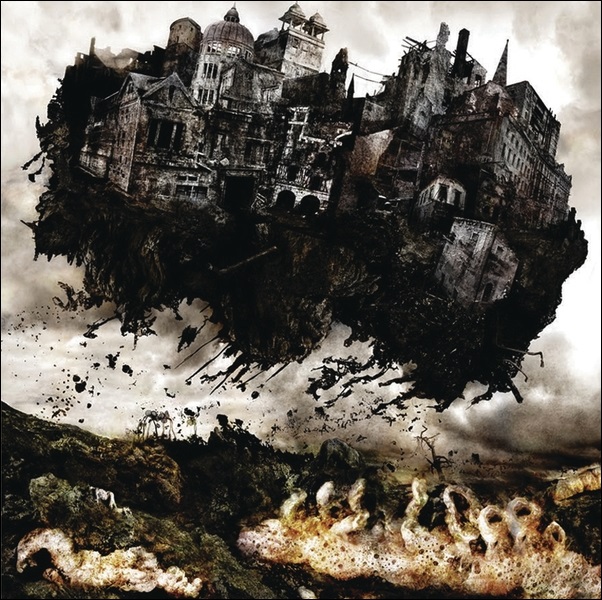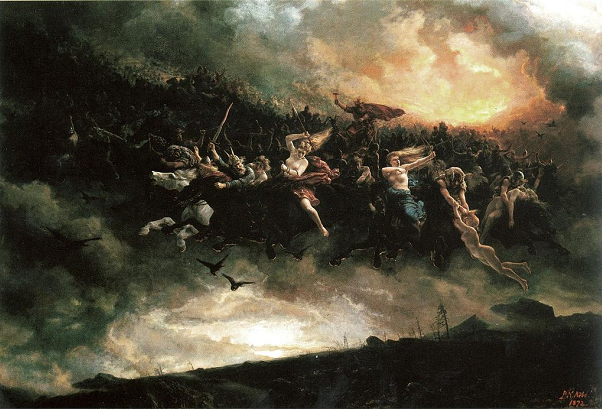Unholy: perhaps it’s a useful word
[ by Charles Cameron — when religion casts a long and violent shadow ]
.

cover art for the Unholy album, New Life behind Closed Eyes
**
Unholy may prove to be a very useful word, I think.
It’s not secular, it’s not irreligious, it doesn’t lack for some sort of supernatural influence — in fact it fits right in with the metaphysical implications of such Biblical phrases as (Revelation 12.7):
there was war in heaven: Michael and his angels fought against the dragon; and the dragon fought and his angels
and (Ephesians 6.12):
we wrestle not against flesh and blood, but against principalities, against powers, against the rulers of the darkness of this world, against spiritual wickedness in high places
**
Because, I am arguing, it is neither secular nor irreligious, it fits perfectly, I’d say, the kinds of situation we’re in so freuqnetly, globally, of religiously motivated group violence.
The word jihad — besides focusing entirely on Islamic variants, when in fact Buddhist, Hindu and Christian militians are also in evidence — concedes too much to those who regard their warfare as holy, divinely sanctioned, while other terms make things sound secular and almost normal, as if politics without the religious booster was all we are talking about.
BrutaL and spiritual, spiritual and brutal on both sides — in the Central African Republic, for instance:
It was March 2013 when the predominantly Muslim rebel coalition Séléka swept into the riverside capital, Bangui, from the northeast. President François Bozizé fled as a vicious campaign of looting, torture and murder got underway. Séléka leader Michel Djotodia soon proclaimed himself the successor; he would later lose control of his ranks and an attempt that fall to disband them would do little to stop the atrocities.
At the same time, groups of militias called anti-balaka had begun to form and train and retaliate against Séléka. Their name in the local Sango language means “anti-machete”; their fighters are comprised of ex-soldiers, Christians and animists, who think magic will protect them. They’re adorned with amulets to ward off attacks and fight with hunting rifles, poison-tipped arrows and machetes.
Amulets and machetes.. warriors and angels.
**
Maybe we should say “unholy warriors” and “unholy wars” rather than “holy warriors” or “jihadis” — and “unholy monks” for the Burmese mobsters in saffron robes.
And I’d reserve the use of the term for situations in whiuch at least one side in a conflict openly avows religious motivation. Someone making a treaty someone else feels is foolish or dangerous simply doesn’t meet the bar.
**
It’s worth considering the Unholy CD cover art alongside two other recent images:
and:
And about that top image from the Unholy album, just so you know:
UNHOLY present their Prosthetic Records debut, a metal massacre fueled with down-tuned guitars, double bass and deep grooves akin to the sounds of Entombed, Crowbar and later Carcass, with members having been in bands like Santa Sangre, Another Victim and Path Of Resistance.





February 1st, 2015 at 10:59 am
Isn’t the only difference between holy and unholy the same difference between pornography and non-pornography, in that one knows it when they sees it?
I mean, I see a unholy war going on in the Middle East, but many don’t see it that way.
In fact most see it as a holy war. So are they more correct than I am?
I think your Abrahamic faiths have the numbers on their side.
February 1st, 2015 at 5:50 pm
A lot of people in the west, politicians, pundits, people, want to characterize ongoing Islamist terrorism either by calling it “holy war” or “jihad” — wwhere the sense of religiosity is present but the terms themselves aren’t negative — or as “politics” where the religious sense is absent.
.
The idea behind my suggestion of “unholy war” is that it retains the religious sense, but makes it clear that (in the speaker’s opinion) the events in question are on the evil rather than the good side of the scales.
.
It won’t work everywhere, is by no means a panacea — just an idea which might be useful on occasion.
February 2nd, 2015 at 8:52 pm
I think anytime one side believes it to be a “holy war”, then it’s irrelevant what term the other side wants to use. It is either accepted and understood for the sake of establishing a baseline for how to deal with the enemy or the side refusing to accept the concept will fight blindly without acknowledgement of what the driving factors are (understanding rule of Jihad). It’s difficult to compare what Islam is doing with any other “extremist” or “holy warriors” because the concept is clearly laid out in their holy texts….it’s not clearly defined in other religions (referencing God telling someone to go kill so and so in the old testament is still ambiguous). Muhammad advocated it and conducted the same warfare himself with very clear and specific rules. This is all very well documented and accepted by Islamic scholars (not to mention nation states). The same application won’t work with Christianity, Buddhism, Hinduism, etc because the religions have a much different foundation. How many people did Christ, Buddha, or Ghandi kill?
I don’t think the term “holy” associated with war is meant to mean “good”. Replace “holy war” with “spiritual war”.
February 3rd, 2015 at 12:30 am
Hello G:
I’d be interested to know what you find ambiguous about the OT texts. I may post something about this later, but it’s a huge subject and one where very strong feelings are easily aroused, so writing up something that’s comprehensive enough can take quite a while. For the moment, I’ll just say that I’ve read a number of comparisons that “explain” OT violence in ways that the writers do not then apply to Qur’anic equivalents.
.
One really needs something close to equal theological knoweldge of two religions to compare them fairly.
.
As to Hinduism, Gandhi isn’t the man to quote — think rather of Krishna in the Bhagavad Gita, who orders Arjuna to fight at Kurukshetra despite Arjuna being initially very reluctant to do so. Wikipedia then reports (again, I should really get the scholarly details from van Buitenen, but I’m pressed for time and the story is extremely complex:
An akshauhini is defined as a battle formation that “includes 21,870 chariots and chariot-riders, 21,870 elephants and riders, 65,610 horses and riders, and 109,350 foot-soldiers (in a ratio of 1:1:3:5).”
.
Even allowing for the Indian temptation to deal in excessively high numbers, perhaps not surprisingly “The war left an extremely large number of widows and orphans and led to an economic depression and the beginning of Kali Yuga.”
February 3rd, 2015 at 4:41 pm
Admittedly, I’m more familiar with studies of the Abrahamic religions since those are typically the big three that are referenced with regard to religious violence. I will dig further into Hinduism (something I’ve been meaning to do for a while), but a major ideal within that particular religion is that it’s not something that requires converts. From what I’ve read, there is no clear conversion process or a reason for a group to conquer the other for this reason. With that, I would assess that the wars fought were out of human necessity (resources/power) vs religious domination. I see religion playing a secondary role…more of a sidebar. Yes, Hindu’s were fighting…but was it for the sake of religion?
The old testament references violence…but was it a matter of describing historical events or standing orders? I’ve read much of the Koran and The Bible and the violence referenced in both reads different. After all of the bloody history of the Old Testament, Christs standing orders were pretty much “love they neighbor”, “golden rule”, be good to people, etc. And he didn’t kill anyone.
Islam’s a completely different story. Initially peaceful during the Mecca years, Muhammad’s tone/actions changed drastically once he established a following and power. Starting with raids on the caravans between Median/Mecca, on to the sacking of villages (beheads 900 Jews in one day), slavery, rape…list goes on. His directions were written as standing orders not historical accounts. Now I’m not sure how all of those historical accounts could be “mistranslated” or “misunderstood” as is commonly the defense when discussing Islamic history. Sunna, Hadith, Reliance of the Traveler (with accepted English translations sanctioned by Islamic scholars) will tell one everything they need to know if they have the comprehension and objectivity to understand it.